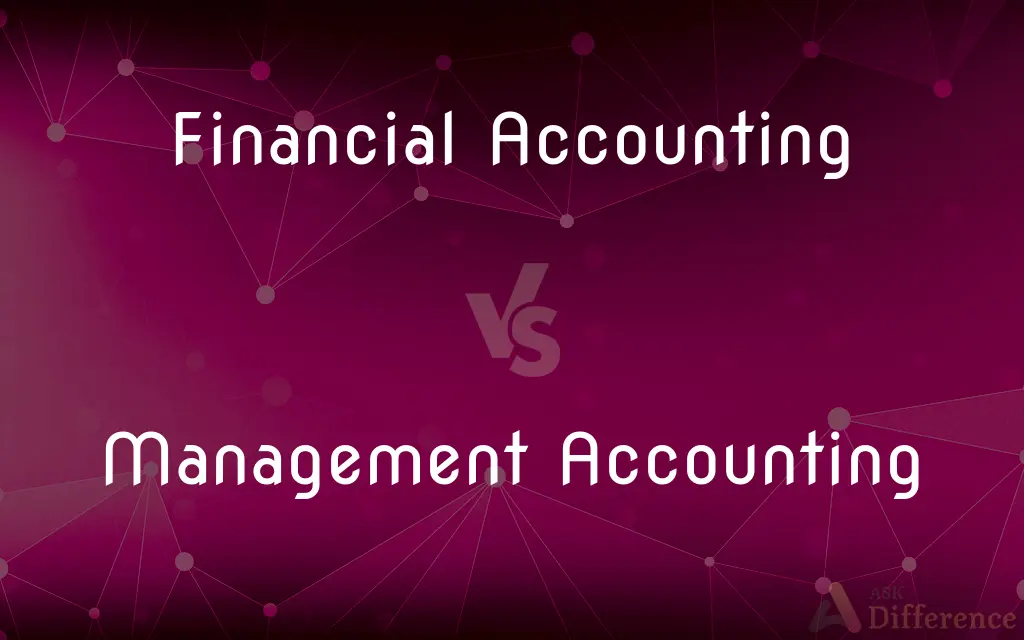Financial Accounting vs. Management Accounting — What's the Difference?
By Tayyaba Rehman — Published on October 22, 2023
Financial Accounting focuses on reporting financial data and transactions to external parties, whereas Management Accounting involves providing financial data and advice to a company's internal management to support decision-making.

Difference Between Financial Accounting and Management Accounting
Table of Contents
ADVERTISEMENT
Key Differences
Financial accounting focuses on creating reports and financial statements for external stakeholders, such as investors and creditors. Management accounting, on the other hand, generates reports primarily for an organization’s internal use, emphasizing future planning and decision-making.
With respect to financial accounting, the generated reports adhere to generally accepted accounting principles (GAAP) and are audited externally. Unlike management accounting, where the reports are not bound by GAAP and are not subject to external audits, providing flexibility in presentation formats and contents.
Financial accounting data is historical in nature, presenting an exact record of financial transactions that have occurred over a period. In contrast, management accounting often involves projections and forecasts, aiming to provide management with a forward-looking perspective to facilitate planning and control.
Periodicity is a key difference where financial accounting is often periodic (quarterly, annually), ensuring stakeholders are regularly updated. Management accounting, however, may not be constrained to periods and can produce reports as needed by management to make timely decisions.
Financial accounting emphasizes objectivity and verifiability in its reports to maintain trust among external stakeholders. In contrast, management accounting may include subjective and estimational data to help managers evaluate various scenarios and choose the best course of action.
ADVERTISEMENT
Comparison Chart
Purpose
Records and reports financial transactions to external entities.
Provides information and insights to an organization’s internal management for decision-making.
Regulations
Strictly adheres to generally accepted accounting principles (GAAP).
Not mandated to follow GAAP, allowing more flexible report formats.
Audience
Targets external stakeholders like investors, creditors, and regulators.
Primarily serves the internal management team of an organization.
Time Orientation
Primarily historical, summarizing past financial transactions.
Forward-looking, often involving forecasts and projections.
Frequency
Periodic reports (e.g., quarterly, annually).
Can be generated as frequently as needed, often without a strict periodic schedule.
Compare with Definitions
Financial Accounting
Financial accounting entails periodic reporting, commonly on a quarterly and annual basis.
The annual report, a key output of financial accounting, is disseminated to all external stakeholders to provide a yearly financial overview.
Management Accounting
It emphasizes forward-looking and often entails financial forecasting and budgeting.
Management accounting helps in formulating the annual budget by forecasting revenues and expenses.
Financial Accounting
It emphasizes ensuring accuracy, reliability, and objectivity in reporting.
Financial accounting necessitates precise data entry to avoid discrepancies in the financial statements.
Management Accounting
Management accounting often incorporates qualitative and subjective information to guide management decisions.
Using management accounting, the team integrated market trends into the product cost analysis.
Financial Accounting
It aims to provide a clear financial snapshot of the entity to external stakeholders.
Through accurate financial accounting, companies can showcase their financial stability and health to potential investors.
Management Accounting
Management accounting involves analyzing, interpreting, and presenting financial data to aid internal management decisions.
Through management accounting, the CFO was able to propose cost-cutting strategies based on analyzed data.
Financial Accounting
Financial accounting adheres to standardized principles like GAAP or IFRS.
Due to the regulatory adherence in financial accounting, the company’s financial statements are audited annually.
Management Accounting
It facilitates the internal management in planning, controlling, and evaluating organizational performances.
Management accounting enables the team to assess departmental performance and implement corrective actions when necessary.
Financial Accounting
Financial accounting encompasses the systematic recording, summarizing, and reporting of financial transactions.
Financial accounting ensures that all of a company's financial transactions are documented in the general ledger.
Management Accounting
Management accounting is not bound by external reporting standards like GAAP or IFRS.
Management accounting reports, unlike financial accounting ones, can be created in a format most useful for the management team.
Common Curiosities
Who uses financial accounting information?
External stakeholders like investors, creditors, regulatory authorities, and tax agencies utilize financial accounting information to make informed decisions.
Does financial accounting focus on historical or future data?
It primarily focuses on reporting historical financial data and transactions.
What is financial accounting?
Financial accounting focuses on tracking, summarizing, and reporting all transactions a business engages in, and it presents this information through financial statements to external stakeholders.
What is accrual accounting in financial accounting?
Accrual accounting recognizes revenues and expenses when they are earned or incurred, regardless of when cash is exchanged.
What is management accounting?
Management accounting focuses on providing accounting information within an organization so that its management can operate more effectively.
What are the key financial statements in financial accounting?
The balance sheet, income statement, and cash flow statement are the key financial statements.
Is financial accounting governed by any standards?
Yes, it follows various international and national standards, such as Generally Accepted Accounting Principles (GAAP) or International Financial Reporting Standards (IFRS).
Who are the primary users of management accounting information?
Internal stakeholders such as managers and decision-makers within the organization predominantly use management accounting information.
Is management accounting focused on historical or future data?
While it uses historical data, management accounting primarily emphasizes future-oriented information to assist in planning and forecasting.
Does management accounting have to comply with accounting standards?
No, management accounting is not mandated to follow external accounting standards like GAAP or IFRS.
Why is consistency important in financial accounting?
Consistency in financial accounting ensures that the financial information is comparable and reliable across different accounting periods.
How is cost accounting related to management accounting?
Cost accounting is a subset of management accounting, focusing specifically on analyzing and controlling costs, helping management to understand the impact of cost on profitability.
Can management accounting utilize non-financial data?
Yes, management accounting often integrates financial with non-financial data to provide comprehensive insights for internal decision-making.
How does management accounting contribute to strategy formulation?
Through budgeting, forecasting, and providing insights through data analysis, management accounting helps formulate and support strategic decisions.
What is the main purpose of management accounting?
The main purpose is to assist management in planning, controlling, and decision-making processes within the organization.
Share Your Discovery

Previous Comparison
SWIFT Code vs. IFSC Code
Next Comparison
Red Rock Canyon vs. Grand CanyonAuthor Spotlight
Written by
Tayyaba RehmanTayyaba Rehman is a distinguished writer, currently serving as a primary contributor to askdifference.com. As a researcher in semantics and etymology, Tayyaba's passion for the complexity of languages and their distinctions has found a perfect home on the platform. Tayyaba delves into the intricacies of language, distinguishing between commonly confused words and phrases, thereby providing clarity for readers worldwide.
















































